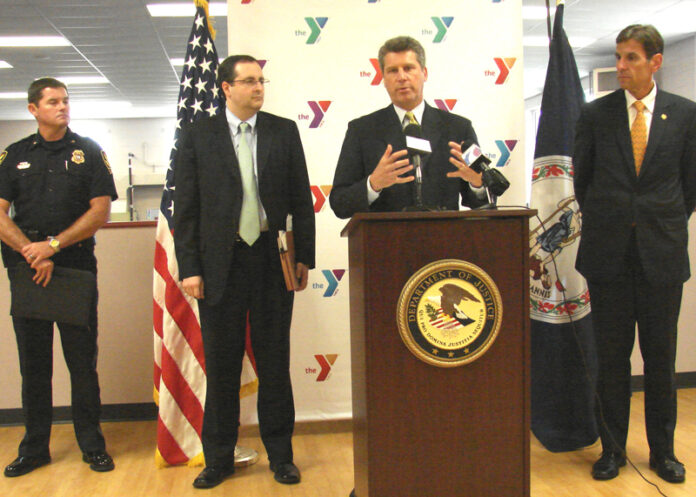
Tim Heaphy, U.S. Attorney for the Western District of Virginia, accompanied by Thomas Perrelli, Associate Attorney General, John Buckovich, Virginia Deputy Secretary for Public Safety, and Roanoke City’s Police Chief Chris Perkins sat at the head of the table in full listening mode last Thursday morning.
Heaphy said that though nationwide violent crimes are trending downward, “there are neighborhoods where there is still a big problem.”
“Every community is different – there is no one size fits all,” said Perrelli. Perrilli wanted forum participants to tell them which strategies are effective and not receiving sufficient funding. “We’re here to listen,” he said.
The number of arrests is not a sign of success. “Arresting everyone is not the answer. We absolutely have got to stop that mode of thinking,” said Chief Perkins. The police department can not tackle crime prevention on its own. Perkins said, “those that say it doesn’t affect me need to understand that it may reach them eventually.”
The Roanoke City Police Department walks the city’s communities. “When you see some of the issues people are dealing with first hand it’s a totally different perspective,” said Perkins. People come out to both compliment and complain. Perkins’ point was that they listen either way.
“It’s like turning a battle ship,” said Perkins, referring to a community’s mind-set.
Heaphy agreed saying, “We can not arrest our way to safer communities. As important as those enforcement efforts will be, they alone will not solve the violent crime problem.”
Heaphy used the three-legged stool analogy. The first leg of that stool is enforcement. The second involves crime prevention programs.
“We haven’t just been locking people up. We’ve also been lifting them up,” said Heaphy. He envisioned focusing more on prevention.
The first line of defense against choosing a criminal life is education. Rita Bishop, school superintendent, and David Carson, chair of Roanoke City School Board, focused on education being the first line of defense against choosing a criminal life. Forest Park Academy is a model for improving graduation rates, setting potential dropouts on the path to a more productive life.
Jane Conlin, director of Social Services, added that the foremost prevention is to “allow children not to grow up in a home where there is violence.” Funding is a problem for those programs that are effective. “We don’t need less – we need more,” she said.
Perrilli agreed that earlier intervention is critical to stemming the cycle of youth violence and that schools play an essential part of that strategy.
“It’s a different world when a parent takes interest in what that child is doing,” said Chief Perkins.
The third leg of the stool is the issue of prisoner reentry. Heaphy said, “research shows that ex-convicts face uphill battles in terms of employment and recidivism.”
Jane Brown, Roanoke director of community programs at the Department of Social Services said, “finding jobs for our convicted felons is practically impossible.” Even with federal tax incentives businesses are not willing to give them a chance. Their only option is to return to crime.
Former Roanoke City council member Gwen Mason was appointed Community Outreach Coordinator in July 2010. Heaphy gave Mason accolades, explaining how she has brought together many different individuals and organizations. Most important is her work identifying federal grant opportunities. “Gwen is doing marvelous things here. My hope is that Tom Perrelli and others in Washington agree and use her new position as a model for similar positions across the country,” said Heaphy.
Collaboration among non-profits and the police department is addressing the root causes of gangs. Roanoke’s Drug Court has proven successful in providing abusers with the treatment they need. Bethany Hall provides programs geared toward drug addicted women. Total Action Against Poverty and Virginia Cares work with ex-offenders to help transition them from prisoners to productive citizens.
Heaphy said, “given there is less and less money available … we need to forge alliances. We need to be willing to put aside lines of authority and work together.” He added that applying for grants as a group rather than separately would better pool resources. “We can no longer afford to be in our own silos,” he said.
The private sector is the missing leg, mused one forum participant, lamenting that there will never be enough money.
Heaphy concluded that Roanoke has a large list of superior service organizations working together to prevent violent crime. “All of these factors provide the foundation we need to implement the Attorney General’s Anti-violence strategy,” he said.

